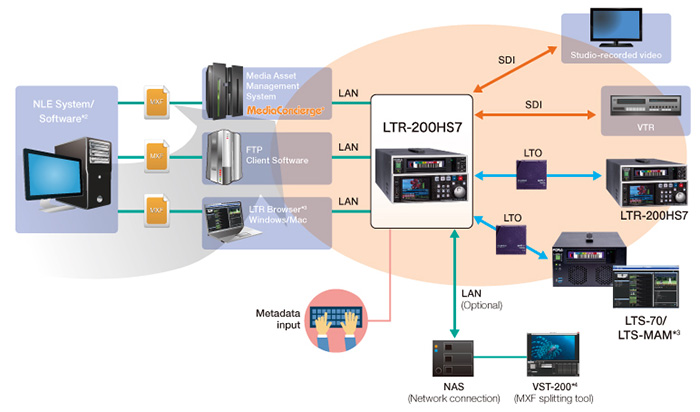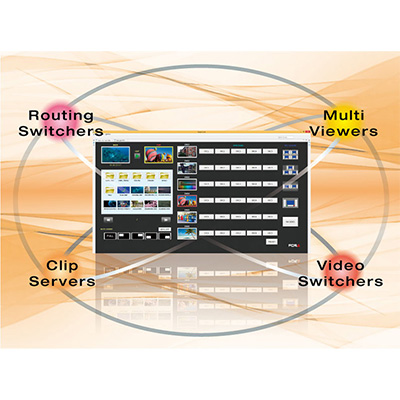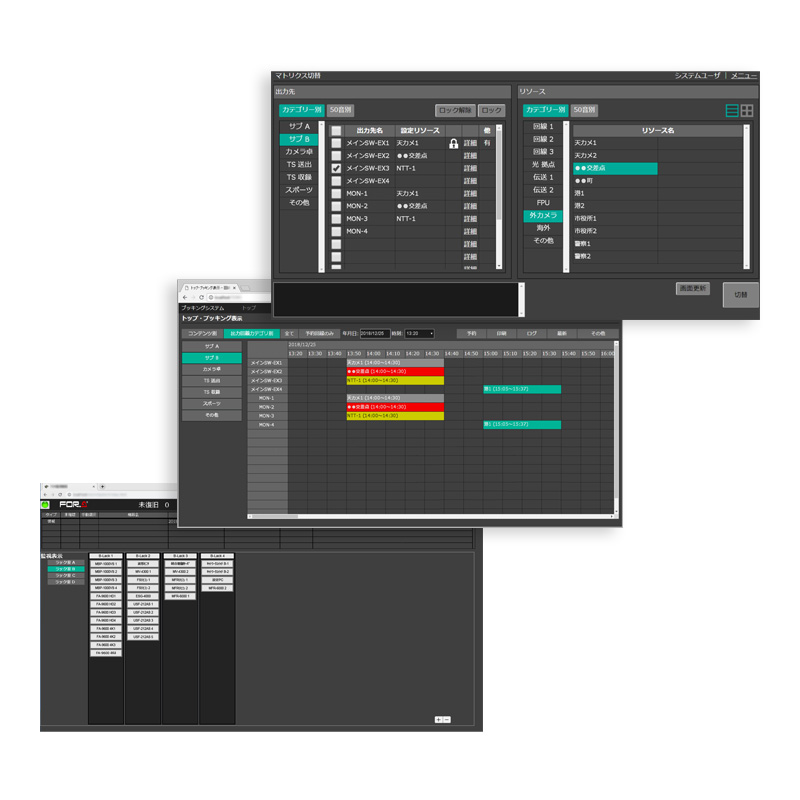Re-defining Media Archive Workflows
A multi-format LTO-7 archiving recorder that also offers a generous 6 TB of internal storage for backup, the LTR-200HS7’s ability to support broad video codecs accommodates many archiving needs. Useful in both archiving and exchange of recorded material or programs, highlights of this full-featured LTFs-based recorder unit include HD/SD-SDI input/output, broadcast-quality codecs, and MXF (OP-1a) wrapping and unwrapping. MXF or MOV files on LTO tape can also be used with NLE systems.
Converts SDI signals to MXF files*1 and records to LTO tape.
Archives material from connected VTRs.
Plays and provides SDI output for MXF les on LTO tape; can also export as MXF les.
Partial Retrieval: Extract needed segments of videofiles on LTO tape as separate files.
LTO Dubbing: Connect another LTR-200HS7 via Ethernet and control duplication from a computer running optional LTS-I-CP software.
1 MOV files when using Apple ProRes (with optional LTR-PRS)
2 MXF file compatibility depends on settings and other devices used. 3 When LTR Browser or LTS-MAM is used, partial retrieval is available. 4 VST-200 can be used to enable MXF file splitting and metadata tagging of entire videotapes in LTR-200HS7. As material is recorded, export MXF files to a NAS device as they are created, using an optional LTR-NAS plug-in, and then back up the edited MXF files to LTO tape as needed. Copy MXF files to a NAS device as they are recorded. Check MXF playback and retrieve needed programs on a computer. MXF files are checked for discontinuous timecodes, and splitting information is created automatically; each split le can be tagged with metadata. Edit MXF files in an NLE system. Back up MXF files to LTO tape in the LTR-200HS7, using menu operations*5. 5 Playback and partial retrieval of video les on a NAS device is not possible from LTR-200HS7. Broad codec and format support includes MPEG-2 and AVC-Intra as well as Avid DNxHD®, and DVCPRO. For programs and other assets, the ability to offer this broad support is an advantage in applications that demand high-quality archiving.Workflow

LTR-NAS workflow

Codecs and formats
Codec HD/SD File Color Depth/Signal Notes MPEG-2 HD 18/25/35 HD MXF OP1a 4:2:0 8-bit SMPTE RDD9-2009 (SONY XDCAM HD) MPEG-2 HD422 50 HD MXF OP1a 4:2:2 8-bit SMPTE RDD9-2009 (SONY XDCAM HD422) AVC-Intra 50 HD MXF OP1a 4:2:0 10-bit Panasonic P2 Archive AVC-Intra 100 HD MXF OP1a 4:2:2 10-bit Panasonic P2 Archive DVCPRO HD 100 HD MXF OP1a 4:2:2 8-bit Panasonic P2 Archive Avid DNxHD® 145/220 HD MXF OP1a 4:2:2 8-bit Avid DNxHD® 220x HD MXF OP1a 4:2:2 10-bit Apple ProRes 422/422 HQ HD MOV 4:2:2 10-bit Optional (LTR-PRS) DVCPRO25 SD MXF OP1a 4:1:1 8-bit Optional (LTR-PD-SD) Panasonic P2 Archive DVCPRO50 SD MXF OP1a 4:2:2 8-bit Optional (LTR-PD-SD) Panasonic P2 Archive




